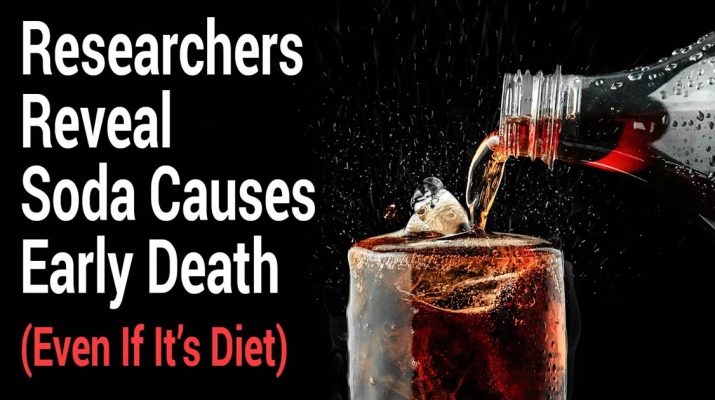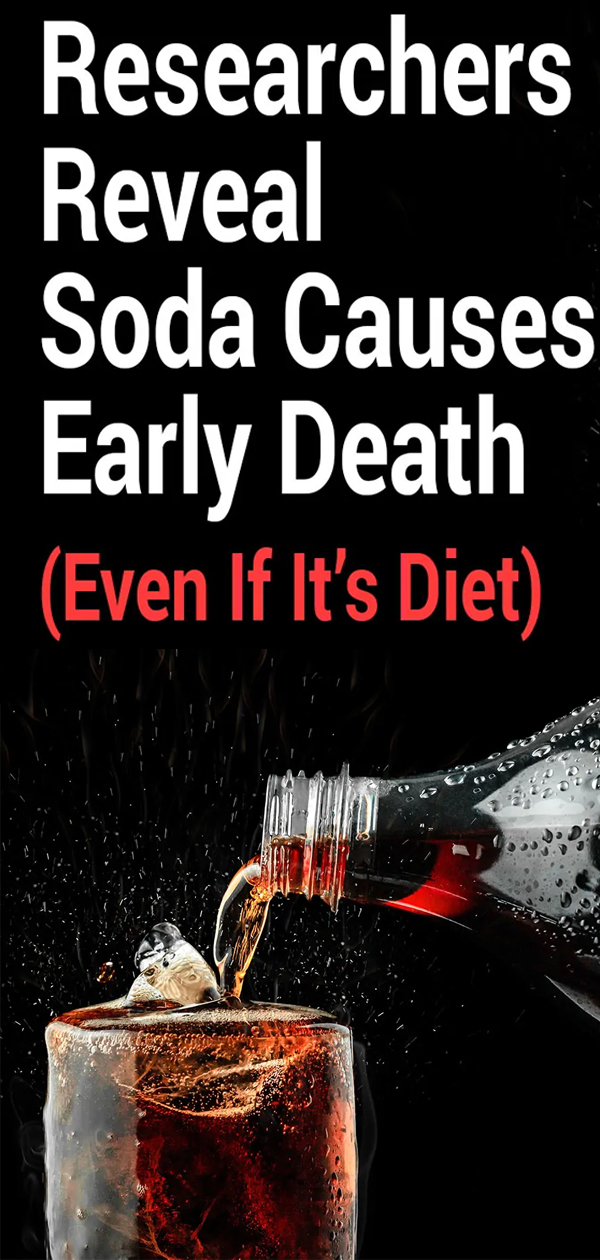In the largest study of its kind, researchers once again linked the consumption of soda to an early death. Published in the Journal of the American Medical Association: Internal Medicine, the study includes nearly 500,000 individuals across 10 European countries.
Indeed, it’s interesting that there appears to be little difference between diet and regular soda. Diet soft drinks seem to be just as deadly as sweet, sugar-laden beverages.
In this article, we’re going to break down the results of the study. Why and how does soda contribute to an early death? Are the results significant? Does the study accurately and truthfully demonstrate the potential harm of soft drinks? Of course, we will answer these questions and others here.
A quick note. Researchers included the following beverages under the umbrella of “soft drinks”: cola, pop, soda, fruit punch, lemonade, energy, and sports drinks (e.g., Monster and Gatorade, respectively), powdered sugar drinks (e.g., Kool-Aid), and “ades” such as lemonade.
So let’s get to it!
Study Background And Purpose
The European Prospective Investigation into Cancer and Nutrition (EPIC) study is one of the largest cohort (“group”) studies in the world. Traditionally, cohort studies are a type of research-based study that’s designed to investigate the cause(s) of disease. Besides investigating the correlation between soft drinks and early mortality, EPIC also researches various issues surrounding the topic of disease acquisition.
According to the International Agency for Research on Cancer (IARC), this EPIC study was conceived in order to “investigate the relationships between diet, nutritional status, lifestyle and environmental” factors and their relationship to cancer and disease.
In the paper, the authors note the lack of scholarship focusing on a potential link between disease and soft drinks. This gap in research is rather striking when one considers the proven link between sugary-drink consumption and obesity.
In a massive, oft-cited 88-study analysis published in the American Journal of Public Health, researchers directly demonstrate “clear associations between soft drink consumption and nutrition and health outcomes.” Including increased calorie intake, heavier body weight, and increased risk of “several medical problems.”
It is on the former note that this study comes out at a dubious time in U.S. history. The number of overweight and obese children and adults have reached epidemic proportions. Consider the below statistics from a huge, multi-state study.
Seven U.S. States – Alabama, Arkansas, Iowa, Louisiana, Mississippi, Oklahoma, And West Virginia – Record Obesity Rates Exceeding 35 Percent.
According to data in the report The State of Obesity: Better Policies for a Healthier America 2018, the U.S. obesity rate is now hovering around 40 percent. Roughly 19 percent of children are now obese. Just two decades ago, these numbers were at 30 percent and 14 percent, respectively.
This writer’s sincere thanks go to the authors of the work.
Elio Riboli, a Professor and Director of Public Health at Imperial College London in the United Kingdom, coordinated this EPIC study. Assisting Professor Riboli in coordination efforts were two esteemed cancer researchers from the International Agency for Research on Cancer (Lyon, France), Dr. Marc Gunter and Dr. Paul Brennan.
Study Design
“Consumption of artificially sweetened soft drinks was positively associated with deaths from circulatory diseases, and sugar-sweetened soft drinks were associated with deaths from digestive diseases.”
~ Mullee, A., et al. (source)
The EPIC program consists of 521,000 citizens across 10 European countries. Following participant recruitment and initial data gathering, study subjects were followed up after an average of 16 years. The large, multinational cohort consisted of participants from Denmark, France, Germany, Greece, Italy, the Netherlands, Norway, Spain, Sweden, and the United Kingdom.
Researchers Collected The Following Information From Study Participants:
Diet:
Participants were administered some version of the quantitative dietary questionnaire, containing over 250 food items. Using this document, participants reported types of food consumed and estimated individual portion sizes.
Lifestyle Factors:
Questionnaire data were collected on several variables known to impact health. Among the information recorded: job history, current employment status, illness history, education, socioeconomic status, known disorders, history of tobacco use, history of alcoholic beverage consumption, physical activity level, and reproductive history.
Body Measurements & Dimensions):
height, weight, waist, hip circumference, body mass index (BMI), and sitting height.
Blood Samples:
Measurements for red blood cells, hemoglobin, hematocrit, white blood cells, and platelet count.
Using this information, researchers excluded individuals reporting a history of cancer, diabetes, heart disease, or stroke. They also left out data they perceived to be inaccurate or incomplete details. Finally, they also disregarded data collected from individuals at-risk for certain diseases.
Here Are Some Statistics From The Chosen Participant Group:
– Number of participants: 451,743 (86.7% of the cohort group)
– Gender: Female ~ 71% of total (321,081)
– The average age at study commencement: ? 51 years
– Average follow-up period (from initial data measurement): ? 16.4 years
– Number of deaths: 41,693 (~ 9.2% of cohort)
Study Results
“The results of this study are significant. It reinforces a fact that won’t surprise anyone in the nutrition field: Processed foods loaded with artificial ingredients will never be the magic bullet to better health, no matter how low they are in sugar. Our bodies are smarter than that.” ~ Sarah Reinhardt, the Union of Concerned Scientists (source)
The EPIC research team analyzed the experimental data from both regular and diet soda users. The key measurement was the total consumption of sugar-sweetened and artificially sweetened soft drinks.
The team reached the following conclusions:
– Individuals who consumed two or more glasses of soda per day had a 17 percent higher chance of early death.
– Drinkers of artificially sweetened soft drinks run a 26 percent higher chance of premature death.
– Science proves a relationship between sweetened soft drinks and death from circulatory diseases.
– Sugary drinks were tied to higher rates of death from digestive diseases. Other disorders correlating with sugar-sweetened beverages include appendix, intestines, liver, and pancreas disease.
The team factored another interesting finding out of the analysis. people who drank more soda tended to be higher in body mass index (BMI). Soda drinkers were also more likely to be tobacco smokers. However, says the study’s lead author, Neil Murphy, these findings did not influence the results. “We made statistical adjustments in our analyses for BI, smoking habits, and other mortality factors,” says Murphy.
So after adjusting for such factors, the research team concludes that smoking habits and BMI do not strongly influence the correlation between soft drinks and mortality rates.
Final Thoughts: Soft Drinks Are Plain Bad
“There are 4.2 grams of sugar in a single teaspoon. Now, imagine scooping up 7 to 10 teaspoons full of sugar and dumping it into your 12-ounce glass of water. Does that sound too sweet? You may be surprised to learn that’s how much added sugar is in the typical can of soda.”
~ Harvard T.H. Chan School of Public Health (source)
Study after study, scientist after scientist, and parent after parent continue to rail against the health effects of soft drinks. In fact, thousands of academic studies over the past fifteen years reach the same conclusion: soft drinks cause weight gain, increase the risk of chronic diseases, and complicate underlying health problems.
What About Other Nations?
According to Harvard University, soft drinks are the top source of added calories and sugar in the U.S. diet. But what about other countries? Do these places also experience the same adverse health issues from soda and soft drink consumption?
In countries where soft drink consumption has risen, so has the incidence of disease. Such describes the rather recent phenomenon of soft drink consumption and an increase in diabetes cases in Asia.
In a 2010 study published in the American Journal of Epidemiology, researchers cite a direct correlation between “epidemic proportions” of type 2 diabetes in Asia and “increased consumption of soft drinks, juice … and other sweetened drinks.”
Moreover, the research team cites the proven correlation between poor health outcomes and soft drink consumption in the U.S. as ample evidence. One of the statistics included in the study worthy of pause: Type 2 diabetes mellitus in Asia is 3-5 times higher than it was just 30 years ago.
Why?
Because this increase in diabetes prevalence is very similar to that experienced in the United States between 1980 and 2010. In fact, around 2.5 percent of the population had a diabetes diagnosis in 1980. However, this number rose to around 7 percent by 2010.
The evidence is rather overwhelming. Soda and other soft drinks adversely affect health. Continuous and excessive consumption of soft drinks also certainly contributes to chronic disease, obesity, and early death.
In other words, soft drinks are just plain bad.


